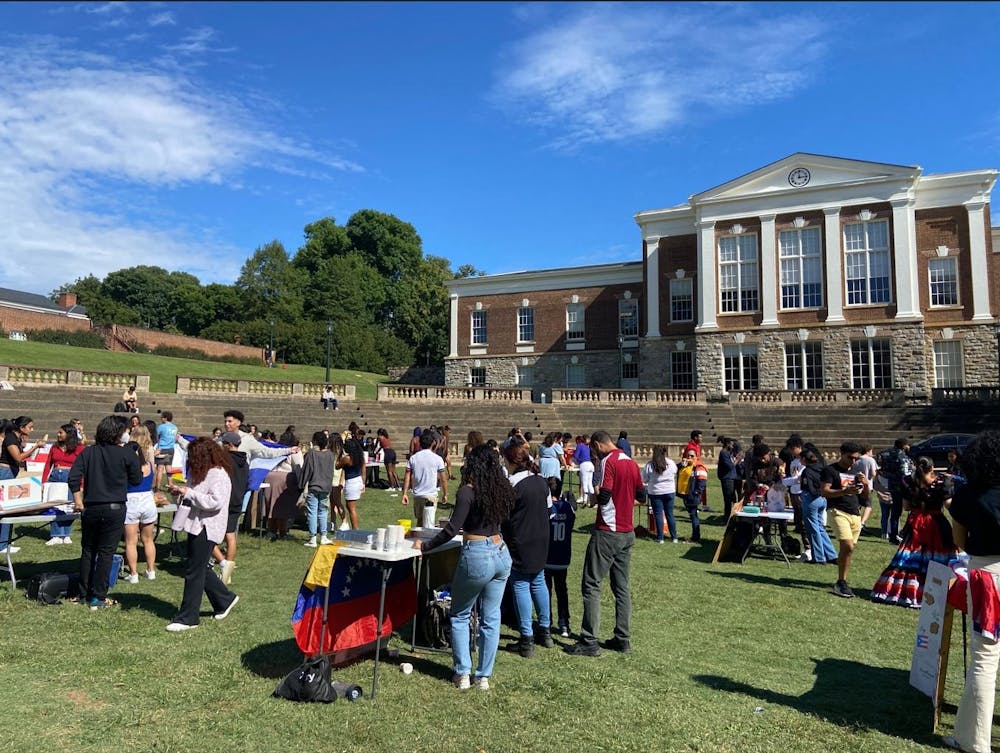This past Saturday, on an early fall afternoon in Charlottesville, upbeat Soca, Latin and Afrobeats music echoed throughout the Amphitheater. Attendees trickled steadily down the stone steps, and student organizers set up for the annual Cultura Fest hosted by the Cultural Organization for Latin American Students.
Students proudly put up flags on tables around the McIntire Amphitheater representing a variety of Latin American countries, such as the Dominican Republic, Guatemala, El Salvador, Haiti and many more. Each country represented in Cultura Fest also had a tri-fold board that presented general information about the country and its culture, replete with history and fun facts about the region.
During the event, several students were performing dances onstage. AfroHoos dance group performed a routine set to Afrobeats music, and first-year Engineering student Stephanie Castro performed a Mexican folk dance. Passionate about dance, Castro also started her own group on Grounds dedicated to Mexican dance, Ballet Folklorico Mexicano.
“I really enjoy sharing Mexican folklore and I was like, I kinda want to dance, and my friend was like yeah you should text them, so I did,” Castro said.
For second-year College student Yaritza Rodriguez, who first attended Cultura Fest last year, the event sparked her interest in participating this year, where she managed the table for Guatemala.
“It's important to be seen on campus, especially during a time where it feels like you’re not welcomed,” Rodriguez said. “So personally, that's why I wanted to participate and show like, hey, I'm a proud Guatemalan, and I'm not gonna be ashamed of who I am. I also brought out a bunch of fabrics that are all done by hand, and I'm wearing some of my jewelry from Guatemala. It's all jade, [Guatemala] has the biggest reserves in Central America.”
Most booths also provided traditional food and drinks from their respective countries, such as tamales, arepas, empanadas, chuchitos and brigadeiros. COLA provided to-go boxes, plastic cups, utensils and napkins for attendees who were walking around the different tables, sampling the variety of food and drink.
Second-year graduate student Aria Lopez oversaw the table for Venezuela at the festival. She wished to share her culture and food after noticing there are not many places that offer Venuzeulan cuisine in Charlottesville. Lopez moved from Venezuela to Argentina six years ago and moved to Charlottesville with her family to pursue gradate studies.
“This is our first year here in the US and in Charlottesville … so we wanted to share who we are,” Lopez said. “It’s not very common that you see Guatemalan or Venezuelan foods at restaurants, so I was very happy to share that.”
Many other groups such as Political Latinxs United for Movement and Action in Society and Central Americans for Empowerment at U.Va. participated in tabling alongside students representing specific countries.
Leianis Gunn, co-president of COLA and fourth-year College student, was a part of organizing and planning the event.
“We're a very small community here, and we're a very close community because of that,” Gunn said. “I think it's important to show different perspectives, different identities at U.Va. and be able to celebrate that, especially with things that are going on around Grounds right now. It's refreshing to have an event like this where people can proudly represent who they are, and show off their culture in a way that's beautiful.”
Despite learning about her mother’s Puerto Rican culture while growing up, Gunn was never able to see herself represented in the depiction of Latin America, which is why she initially joined COLA.
“My mother's Puerto Rican — a racially ambiguous Puerto Rican, or mixed race Puerto Rican — and my dad is African American,” Gunn said. “I look a lot more phenotypically Afrocentric, a lot more Black. I feel like because of the way that Latin America is so incorrectly depicted in the United States and the way it's talked about, I never really saw people like me representing organizations like this.”
As COLA’s co-president, Gunn hopes to broaden the scope of Latin American identity, ensuring that Black, Indigenous and LGBTQ+ students feel represented and heard.
“Having that representation is really important for me … Because there isn't one face to Latin America,” Gunn said. “There's no way to look Latin American, there's no way to be Latin American.”







